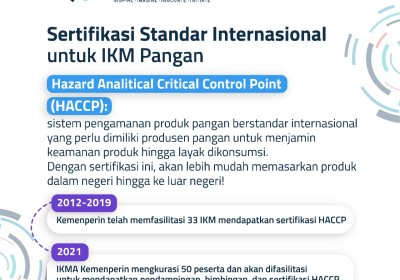Food-producing IKMs assisted by the government in acquiring international certificates
February 19, 2021
JAKARTA - The Industry Ministry (Kemenperin) hopes that small-to-mid scale industry (IKM) businesses in the food and consumption sectors would not only focus on sustaining themselves in the midst of the COVID-19 pandemic, but also on increasing their sales by diversifying their markets and seeking opportunities to sell abroad.
According to the Kemenperin’s director general for small, medium and miscellaneous industries (IKMA) affairs Gati Wibawaningsih, the requirements for food-related exports tend to be very strict. “That is why we are facilitating their efforts to increase their turnover, use high-quality technology more effectively and diversify their markets in order to upgrade their operations,” Gati said in Jakarta on Saturday (13/2) in a press release.
Gati added that the growth of Indonesia’s food-related IKMs are crucial in increasing the value of the country’s natural resources and in fulfilling the needs of both domestic and international markets. Currently, 1.6 million of Indonesia’s 4.5 million IKM businesses operate in the food and consumption sector.
One of the Kemenperin’s efforts to help IKMs become more internationally competitive is to push the importance of acquiring a Hazard Analytical Critical Control Point (HACCP) certificate for all products in order to improve quality.
HACCP is an internationally recognized product security certificate that all food producers must acquire to confirm that their products are fit for consumption. To emphasize the importance of this certification, the Kemenperin’s IKMA department held a 4-day webinar to assist food-related IKMs in ensuring that their products meet international standards.
“The topics discussed at this event include tips on how to produce good-quality processed foods, as well as how they can fulfill the requirements needed to acquire a HACCP certificate by understanding the importance of the certification itself,” Gati explained. She also hopes that the participants of this discussion event would put what they learned into immediate effect by focusing on how they can fulfill HACCP requirements.
From a total of 488 participants, only 50 passed the IKMA department’s curation process and will therefore receive additional training and assistance by the department to help them acquire HACCP certification.
By acquiring a HACCP certificate, food-related IKMs will find it easier to sell their products overseas. “We have also partnered with several marketplaces and members of the diaspora abroad. Through these partnerships, there is great potential to increase the quality and variety of our exports,” Gati said.
HACCP consultant Jamal Zamrudi said that HACCP certificates are easier to be obtained if the IKMs already hold crucial business permits such as the P-IRT/MD and Halal certificates. It is crucial for businesses to have these permits because it ensures customers that the product is entirely safe for consumption.
“Having this certificate will help bolster the businesses’ reputations, ensure customer satisfaction, and can also improve the industry’s business climate, proving that IKMs are compliant with the necessary rules,” Jamal said.
HACCP’s requirements include the ability of the business to effectively analyze potential risks, determine critical points, implement proper product monitoring, verification and corrective action procedures, and develop an effectual recording system.
Jamal added that all risks related to the production and distribution processes will be tested to ensure IKMs can fulfill the minimum risk-handling standard. “We understand that risks are different depending on the type of product. We will hold these tests according to the product’s specification and regulation,” he said.
According to the HACCP’s most recent updates regarding standards in 2020, all producers must list all types of allergens (and the amount) used in their product, if any, in their HACCP submission documents as a way of fulfilling the HACCP’s sanitary and contamination prevention requirements. Such requirements are needed to be able to export to certain markets such as the United States.
Between 2012 and 2019, Kemenperin’s certification assistance program have successfully helped 33 IKMs acquire the HACCP certificate and another 500 IKMs in acquiring halal certificates.
Indonesia’s Research Institutions Supporting the Development of the Electric Vehicle Industry
Indonesian Muslim Fashion and Cosmetics IKMs Shine at Dubai World Expo 2020
Govt Steps Up UMKM Transformation Efforts in the Midst of Pandemic Slowdown
Govt Encourages Promotion of IKM Products in Digital Era
Government Begins Developing Maritime Training Center in Makassar
Tweets by IDDevForum
